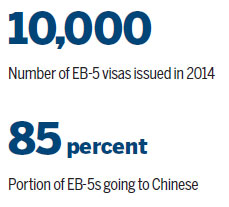Congress eyes EB-5 changes
Updated: 2016-09-15 12:02
By Paul Welitzkin in New York(China Daily USA)
|
|||||||||
Legislation in Washington to extend an immigrant investor program that is popular with the Chinese could affect past, present and future participants if the proposed changes to the program become law.
Known as the EB-5 visa program, it is designed for foreigners who invest at least $500,000 in a project that will create a minimum of 10 jobs in an economically-depressed region in the US. In return the investors receive a two-year visa with a good chance of obtaining permanent residency for them and their families.
In 2014, the US issued more than 10,000 of the visas and about 85 percent went to people from China.
Bills under consideration in the US House of Representatives and Senate would increase the minimum EB-5 investment from $500,000 to $800,000 for projects in high unemployment areas. In low unemployment regions, the minimum investment would rise to $1.2 million from $1 million.
The higher minimums would also apply to applications that were filed as far back as June 1, 2015.
David North, a fellow at the Center for Immigration Studies in Washington, said the minimum investment was set back in 1993 and there has been no adjustment for inflation since then.
"Other nations charge much more than we do. For example it is $1.5 million in the Bahamas," North said. Even at $800,000, "it is a screaming bargain at that rate," he said.
Stephen Yale-Loehr, a law professor at Cornell University and an immigration attorney, said the retroactivity provision will likely raise legal concerns.

"The US Supreme Court has held that Congress should not normally change the rules in the middle of the game. Fundamental notions of fairness counsel against applying new rules to conduct that predates the legislation, since individuals should have an opportunity to know what the law is and to conform their conduct accordingly. The retroactivity provision would surely be challenged in court," said Yale-Loehr.
He believes that most current investors who have already filed EB-5 petitions would attempt to comply with whatever new rules Congress enacts. But if the changes ever become law they "would certainly dampen enthusiasm for the EB-5 program. That would be unfortunate since the program creates thousands of jobs each year for US workers at no expense to American taxpayers," said Yale-Loehr.
Barry Hersh, a professor at New York University's Schack Institute of Real Estate, said there has been talk about raising the amount required for an EB-5 visa and preventing abuses in the program.
"If these proposed rules are put in effect, it will undoubtedly impact many projects; some will still be able to attract EB-5 funding but at a higher cost, others will find alternative but likely higher cost sources of financing and still proceed, but other projects are likely to be stalled or even abandoned," Hersh said in an email.
"EB-5 has mostly been used in New York, San Francisco and other major markets, but its use has been spreading," he continued. "Tighter rules and higher costs may well discourage those who have not done EB-5 transactions from even trying, but New York and other major EB-5 markets would also be impacted."
Hersh believes developers will be able to work around whatever changes Congress makes to EB-5.
"There was real estate development, even booms, before EB-5 and in today's world there are more sources of financing for US development, including crowdfunding and non EB-5 international investment from China and elsewhere into the US, than in the past. Real estate developers find a way," he said.
paulwelitzkin@chinadailyusa.com
-
 China launches second space lab into orbit
China launches second space lab into orbit 
 Riding on smart cycles in Nanjing city
Riding on smart cycles in Nanjing city
 Britain records warmest September day since 1911
Britain records warmest September day since 1911
 Island retreats you may not want to miss for holidays
Island retreats you may not want to miss for holidays
 Industrial-style canteen surprises university students
Industrial-style canteen surprises university students
 Cute animals share a bite of moon cake festival
Cute animals share a bite of moon cake festival
 Orphaned Chinese marries American at SOS village
Orphaned Chinese marries American at SOS village
 French royal porcelains shine in Xi'an
French royal porcelains shine in Xi'an
Most Viewed
Editor's Picks

|

|

|

|

|

|
Today's Top News
Trump outlines anti-terror plan, proposing extreme vetting for immigrants
Phelps puts spotlight on cupping
US launches airstrikes against IS targets in Libya's Sirte
Ministry slams US-Korean THAAD deployment
Two police officers shot at protest in Dallas
Abe's blame game reveals his policies failing to get results
Ending wildlife trafficking must be policy priority in Asia
Effects of supply-side reform take time to be seen
US Weekly

|

|









